Serving 2,952 students in grades 8-12, Olympia High School ranks in the bottom 50% of all schools in Florida for overall test scores (math proficiency is bottom 50%, and reading proficiency is bottom 50%).
The percentage of students achieving proficiency in math is 26% (which is lower than the Florida state average of 52%). The percentage of students achieving proficiency in reading/language arts is 50% (which is lower than the Florida state average of 52%).
The student:teacher ratio of 25:1 is higher than the Florida state level of 17:1.
Minority enrollment is 75% of the student body (majority Hispanic), which is higher than the Florida state average of 65% (majority Hispanic).
Quick Stats (2025)
- Grades: 8-12
- Enrollment: 2,952 students
- Student:Teacher Ratio: 25:1
- Minority Enrollment: 75%
- Graduation Rate: 93% (Top 30% in FL)
- Overall Testing Rank: Bottom 50%
- Math Proficiency: 26% (Btm 50%)
- Reading Proficiency: 50% (Top 50%)
- Science Proficiency: 59% (Top 30%)
- Source: National Center for Education Statistics (NCES), FL Dept. of Education
Top Rankings
Olympia High School ranks among the top 20% of public schools in Florida for:
Category
Attribute
Diversity
School Overview
Olympia High School's student population of 2,952 students has declined by 9% over five school years.
The teacher population of 120 teachers has declined by 14% over five school years.
Grades Offered
Grades 8-12
Total Students
2,952 students
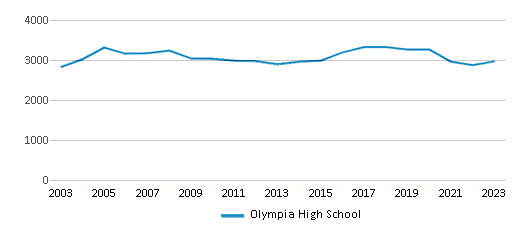
Gender %
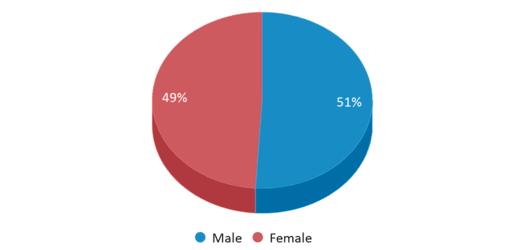
Total Classroom Teachers
120 teachers
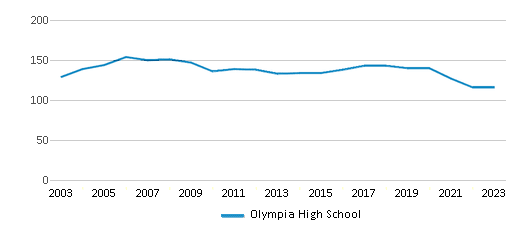
Students by Grade
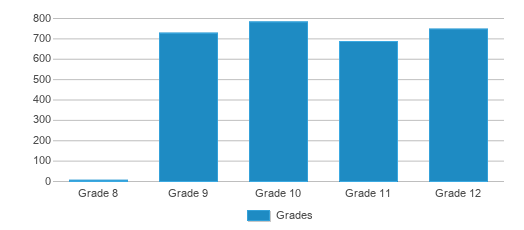
School Rankings
Olympia High School ranks within the bottom 50% of all 3,704 schools in Florida (based off of combined math and reading proficiency testing data).
The diversity score of Olympia High School is 0.73, which is more than the diversity score at state average of 0.70. The school's diversity has stayed relatively flat over five school years.
Overall Testing Rank
#2575 out of 3704 schools
(Bottom 50%)
(Bottom 50%)
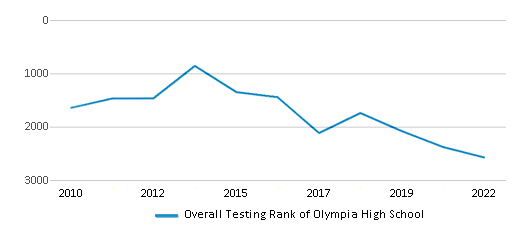
Math Test Scores (% Proficient)
26%
52%
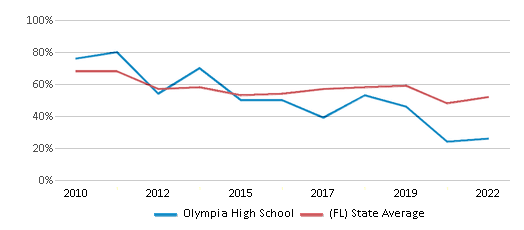
Reading/Language Arts Test Scores (% Proficient)
50%
52%
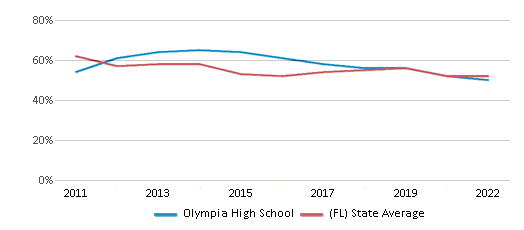
Science Test Scores (% Proficient)
59%
52%
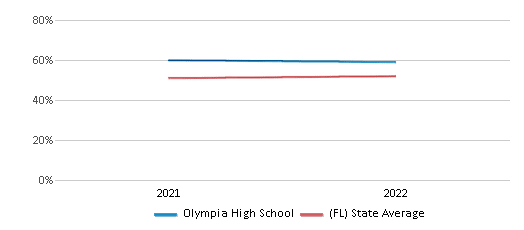
Student : Teacher Ratio
25:1
17:1
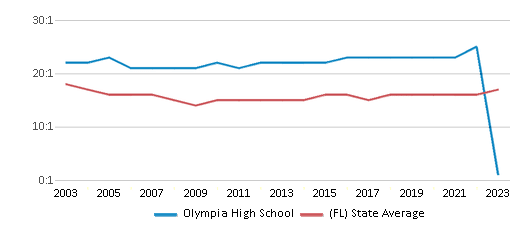
American Indian
1%
n/a
Asian
7%
3%
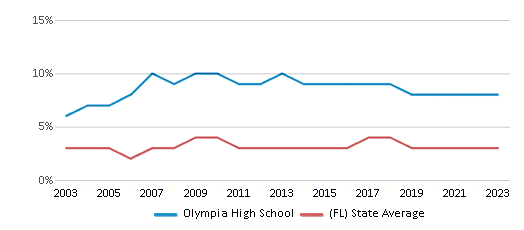
Hispanic
37%
37%
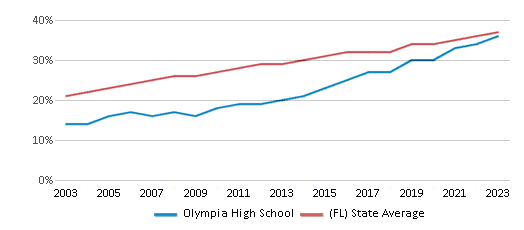
Black
27%
21%
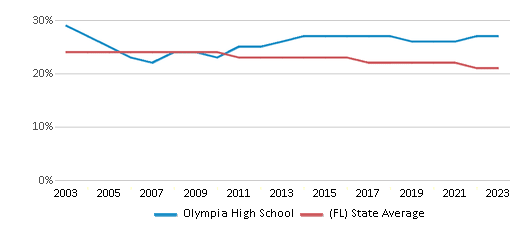
White
25%
35%
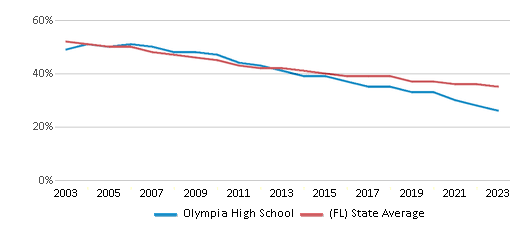
Hawaiian
1%
n/a
Two or more races
2%
4%
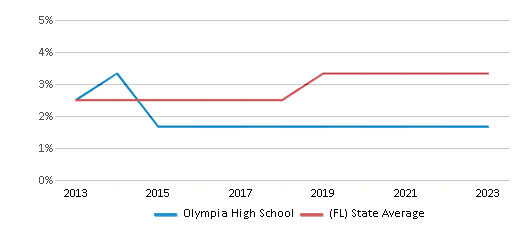
All Ethnic Groups
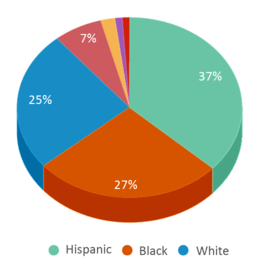
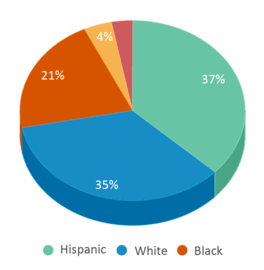
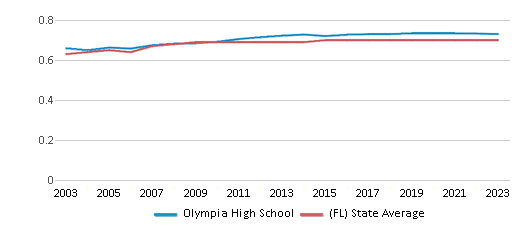
Graduation Rate
93%
87%
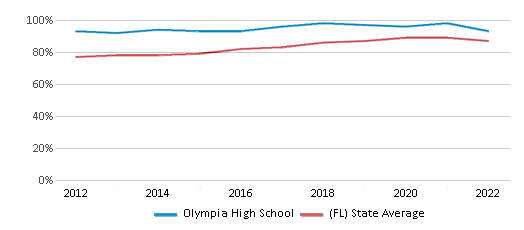
Participates in the National School Lunch Program (NSLP)
Yes
Eligible for Free Lunch
30%
47%
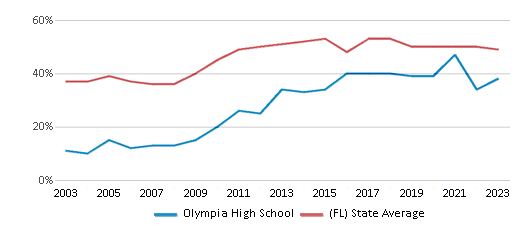
Eligible for Reduced Lunch
3%
4%
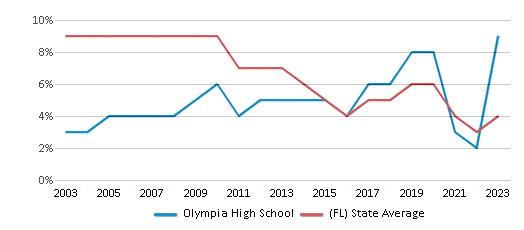
School Statewide Testing
School District Name
Source: National Center for Education Statistics (NCES), FL Dept. of Education
Profile last updated: 02/09/2025
Frequently Asked Questions
What is Olympia High School's ranking?
Olympia High School is ranked #2575 out of 3,704 schools, which ranks it among the bottom 50% of public schools in Florida.
What schools are Olympia High School often compared to?
Olympia High Schoolis often viewed alongside schools like Dr. Phillips High School by visitors of our site.
What percent of students have achieved state testing proficiency in math and reading?
26% of students have achieved math proficiency (compared to the 52% FL state average), while 50% of students have achieved reading proficiency (compared to the 52% FL state average).
What is the graduation rate of Olympia High School?
The graduation rate of Olympia High School is 93%, which is higher than the Florida state average of 87%.
How many students attend Olympia High School?
2,952 students attend Olympia High School.
What is the racial composition of the student body?
37% of Olympia High School students are Hispanic, 27% of students are Black, 25% of students are White, 7% of students are Asian, 2% of students are Two or more races, 1% of students are American Indian, and 1% of students are Hawaiian.
What is the student:teacher ratio of Olympia High School?
Olympia High School has a student ration of 25:1, which is higher than the Florida state average of 17:1.
What grades does Olympia High School offer ?
Olympia High School offers enrollment in grades 8-12
What school district is Olympia High School part of?
Olympia High School is part of Orange School District.
School Calendar
View the Olympia High School yearly calendar below. Note key dates such as:
Event
Date
Spring Break Schools Closed/District Offices Open
March 17, 2025 (Monday)
End of Fourth Marking Period/ Last Day of School
May 28, 2025 (Wednesday)
First Day of School
August 11, 2025 (Monday)
Thanksgiving Break
November 24, 2025 (Monday)
Presidents' Day/Teacher Non-Workday / Schools Closed / District Offices Open
February 16, 2026 (Monday)
School Reviews
4 8/19/2021
Olympia has some great teachers that try to positively impact students' life''s outside and inside the classrooms and they also have belligerent racists and teachers who just don''t care about their students. Overall, I''d say most teachers do care. The quality of academics also depends on the teacher and their Methods of teaching.
5 9/1/2016
Planning to move 15yr old to Olympia.Reviews from friends always the best.
5 2/1/2009
Olympia is one of the best high schools in the Orlando area. The academics are excellent, the majority of students participate in cllubs and afterhours activities, and the teachers truly care about students.
Review Olympia High School. Reviews should be a few sentences in length. Please include any comments on:
- Quality of academic programs, teachers, and facilities
- Availability of music, art, sports and other extracurricular activities
Recent Articles

What Is A Charter School?
Explore the world of charter schools in this comprehensive guide. Learn about their history, how they operate, and the pros and cons of this educational innovation. Discover key facts about charter schools, including admission policies, demographics, and funding, as well as what to look for when considering a charter school for your child.

10 Reasons Why High School Sports Benefit Students
Discover the 10 compelling reasons why high school sports are beneficial for students. This comprehensive article explores how athletics enhance academic performance, foster personal growth, and develop crucial life skills. From improved fitness and time management to leadership development and community representation, learn why participating in high school sports can be a game-changer for students' overall success and well-being.

February 05, 2025
Understanding the U.S. Department of Education: Structure, Impact, and EvolutionWe explore how the Department of Education shapes American education, from its cabinet-level leadership to its impact on millions of students, written for general audiences seeking clarity on this vital institution.





